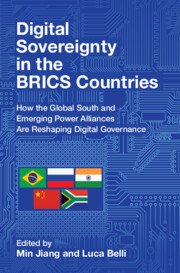 Digital Sovereignty in the BRICS Countries
Digital Sovereignty in the BRICS Countries Book contents
- Digital Sovereignty in the BRICS Countries
- Communication, Society and Politics
- Digital Sovereignty in the BRICS Countries
- Copyright page
- Contents
- Figures
- Tables
- Contributors
- Preface
- Acknowledgments
- Special Acknowledgments: Institutional Sponsors for Open Access
- Abbreviations
- 1 Introduction
- Part I State-centric Formations of Digital Sovereignty
- Part II Techno-economic Structurings of Digital Sovereignty
- Part III Grassroots Contestations of Digital Sovereignty
- References
- Index
- References
References
Published online by Cambridge University Press: 31 December 2024
- Digital Sovereignty in the BRICS Countries
- Communication, Society and Politics
- Digital Sovereignty in the BRICS Countries
- Copyright page
- Contents
- Figures
- Tables
- Contributors
- Preface
- Acknowledgments
- Special Acknowledgments: Institutional Sponsors for Open Access
- Abbreviations
- 1 Introduction
- Part I State-centric Formations of Digital Sovereignty
- Part II Techno-economic Structurings of Digital Sovereignty
- Part III Grassroots Contestations of Digital Sovereignty
- References
- Index
- References
- Type
- Chapter
- Information
- Digital Sovereignty in the BRICS CountriesHow the Global South and Emerging Power Alliances Are Reshaping Digital Governance, pp. 239 - 274Publisher: Cambridge University PressPrint publication year: 2025
- Creative Commons
- This content is Open Access and distributed under the terms of the Creative Commons Attribution licence CC-BY-NC 4.0 https://creativecommons.org/cclicenses/
